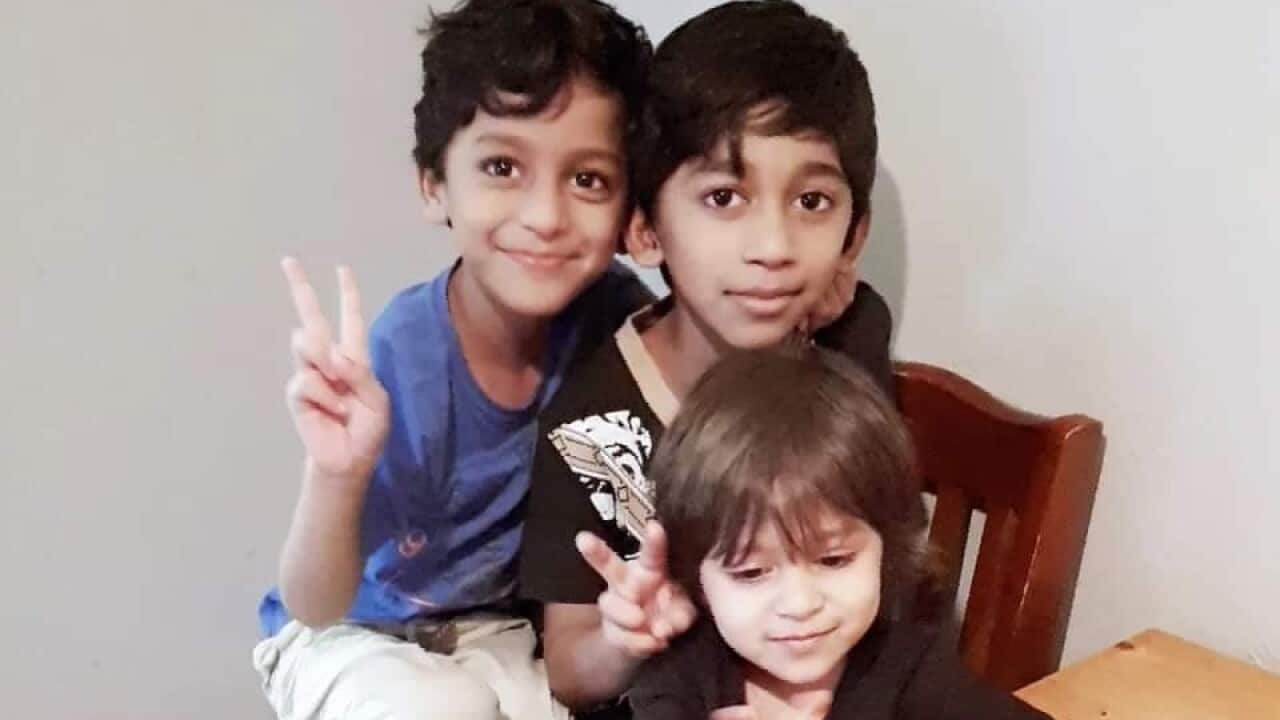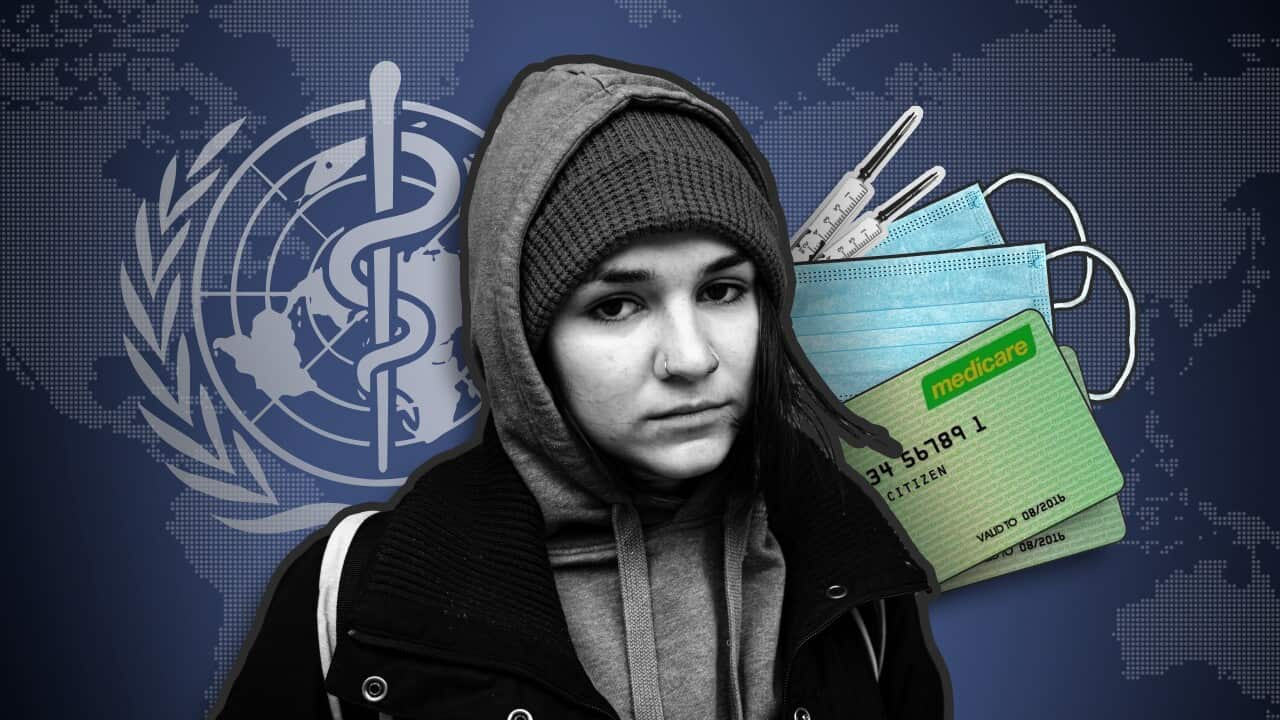

9 min read
This article is more than 2 years old
What will happen to the asylum seekers who Australia refused to let in?
Years after the Manus Island detention centre in Papua New Guinea closed, more than 100 men from the centre are still in PNG and still uncertain about their futures.
Published 24 July 2022 7:13am
By Stefan Armbruster
Source: SBS News
Image: Mehrdad Memarbashi with his wife Marie and daughter Mania in Port Moresby. (SBS News / Stefan Armbruster)
Mehrdad Memarbashi and his family rarely leave their Port Moresby compound after a terrifying home invasion and robbery at their previous accommodation last year.
“Four o’clock in the morning, rascals [PNG gangsters] they attack us. Two of them with guns, one with a bush knife,” said Mehrdad.
“They break the door, come inside and take everything.”
Mehrdad, 39, is an asylum seeker from Iran and lives with his Papua New Guinean wife Marie Resson, 25, and 16-month-old daughter Mania in the capital.
Current Australian government travel advice warns PNG is a dangerous place, especially during elections. Their new compound has a security guard and a newly arrived guard dog after they raised fears about being unsafe.

Mehrdad with his wife and daughter at their compound in the PNG capital Port Moresby. Source: SBS News / Stefan Armbruster
Mehrdad is one of 104 male refugees and asylum seekers still in PNG, of more than 1,300 sent by Australia to Manus in 2013 and 2014 for offshore processing. The Department of Home Affairs says it's not responsible for them.
Former PNG Prime Minister Peter O’Neill, who signed the original deal with then-Australian Prime Minister Kevin Rudd, says he will reinstate the agreement and Australia's responsibility for the men if he wins office in the country’s current election.

Mehrdad Memarbashi with his wife Marie and daughter Mania in Port Moresby. Source: SBS News / Stefan Armbruster
“I just want to leave this country and go and start my life, this is not a life they give to us,” Mehrdad said.
The Australian government announced an end to offshore processing in Papua New Guinea in October last year. All the remaining men received a letter from the country’s chief migration officer Stanis Hulahau, who gave the former Manus detainees three options: go home, go to Nauru or remain and be “managed” by the PNG government.
Family groups were not allowed to relocate to Nauru.

Mehrdad and his daughter and their compound's guard dog. Source: SBS News / Stefan Armbruster
“When I saw Mehrdad, I liked how he talked and I said, ‘He’s a good man’,” said Marie.
Despite resistance from her family to their relationship, she moved to Port Moresby to be with him and they married in 2020.
I just want to leave this country and go and start my life, this is not a life they give to usMehrdad Memarbashi
Mehrdad is a Christian who fled Iran after facing an Islamic revolutionary court. He was rescued from a sinking boat on the way from Indonesia to Australia and sent to Manus Island.
“I (am) treated like an animal, the Australian government, they make us sick, mentally physically, everything,” he said.
He says he carries those physical and mental scars after being held in what the PNG Supreme Court in 2016 ruled as unconstitutional and illegal detention for all the men in the Australian-run offshore processing centre on Manus Island.
The processing centre shut down in 2017 and detainees were moved off the island, which lies about 450km to the north of the PNG mainland. In 2018, the to former detainees on Manus Island.
Mr Rudd and Mr O’Neill signed the controversial offshore processing deal in July, 2013. Months later, the Coalition won the 2013 federal election and then-immigration minister Scott Morrison honed offshore processing as a deterrence measure for people seeking to arrive in Australia by boat.
Both major parties support a policy of not allowing people who seek to arrive in Australia by boat to settle in the country permanently.
Tuesday 19 July marked the ninth anniversary of the Rudd Government signing the offshore processing deal with PNG.

Then Prime Minister Kevin Rudd (right) and Papua New Guinea Prime Minister Peter O'Neill sign the offshore processing agreement between the two countries on 19 July, 2013. Source: AAP / DAN PELED
“PNG got some really bad publicity out of this when we were just helping Australia, Australia did not come to the defence of PNG,” Mr O’Neill told SBS News.
“Australia should have handled it better, especially the treatment of refugees and the repatriations, done in a timely manner.”
PNG elections are currently underway and Mr O’Neill is challenging his successor and great rival James Marape to become prime minister again.
A new government is due to be formed on 4 August.
“Each individual refugee is the responsibility of the Australian government, I don’t know why that has changed but we will go back to that position,” he said.

Former Papua New Guinea prime minister Peter O'Neill is again running for the role in the country's federal election. Source: AP / Aaron Favila
PNG now manages their housing and food, still funded by Australia but Home Affairs would not confirm the cost or for how long it would last.
The letter from chief migration officer Stanis Hulahau offered single men 700 kina ($285) a week for food and living expenses and 1000 kina ($408) for families, a total minimum annual cost of $1.54m for 104 men.
Each individual refugee is the responsibility of the Australian government, I don’t know why that has changed but we will go back to that positionPeter O'Neill
Accommodation like Mehrdad’s “in an apartment with an A grade security service” in the capital’s notoriously expensive housing market is estimated at 2000 kina ($816) per week, another $4.4m a year on the bill. Add fees to service providers and other costs, which all add to the billions of dollars Australia has spent on offshore processing in PNG and Nauru.
“PNG has always been responsible for administering regional processing arrangements and for individuals in PNG,” the Department Home Affairs said in a statement to SBS News.
“Australia’s association with regional processing in PNG ended on 31 December 2021… and transitioned service delivery to PNG’s independent management.

Manus detainees protest over their conditions in Australian-run offshore processing in 2017. Source: Supplied
“It’s a matter for PNG to determine its settlement framework and funding supports and services to persons remaining.”
PNG's Supreme court ruling in 2016 on the illegality of the Manus island detention regime determined that Australia has joint responsibility for the men.
The Queensland Coroner's inquests into the death of Iranian refugee and Manus detainee Hamid Khazaei found Australia "retains responsibility for the care of persons who are relocated, for often lengthy periods, to offshore processing countries".
United Nations rapporteurs have previously said Australia has a "clear and undeniable" responsibility.
These judgments and findings are not recognised under Australian common law.
Italian priest Giorgio Licini has worked in PNG for two decades and is now the general secretary of the influential Catholic Bishops Conference of PNG. He is a leading advocate for refugees in PNG, thousands of West Papuans and the men sent to Manus.
“It leaves us a little bit amazed and surprised that now it’s nine years. Finished, completed. We are entering the 10th year and still there are 104 people here,” he said.
“We believe that some responsibilities formally and publicly are left to PNG, but the financial support is still coming from Australia, still a big amount of money. This giving responsibility to PNG is actually more words than in fact,” he said.
Father Giorgio describes the conditions some of the remaining men have endured as “appalling”.
“It’s something I’ve never seen in my life before, it shocked me,” he said.

Father Giorgio Licini says asylum seekers have been 'trafficked'. Source: SBS News / Stefan Armbruster
“There is no concern on whatever amount of suffering may be inflicted on them for the sake of this deterrence (policy).”
Father Giorgio has assisted in the resettlement of hundreds of the Manus refugees to third countries and is damning of the process.
“Do not forget they were brought to PNG by Australia in exchange for money and projects, these people have been trafficked,” he said.
“From what I understand by domestic laws of the two countries and international law, all this is illegal.”
He estimates about 30 may get resettlement in a third country, leaving about 70 asylum seekers and those who refused to engage with offshore processing behind. About 10 have severe and debilitating mental health issues.
It’s something I’ve never seen in my life before, it shocked meFather Giorgio Licini
Merhdad, like dozens of the remaining men, was interviewed for US resettlement but years later is still awaiting word.
Canada and New Zealand may take some people from PNG under separate arrangements.
“I don’t want to go to Australia, they want to mark you all the time as ‘refugee’, I don’t want to be a refugee, I want to be free, ” Mehrdad said.
Readers seeking support with mental health can contact Beyond Blue on 1300 22 4636. More information is available at . supports people from culturally and linguistically diverse backgrounds.
Would you like to share your story with SBS News? Email



